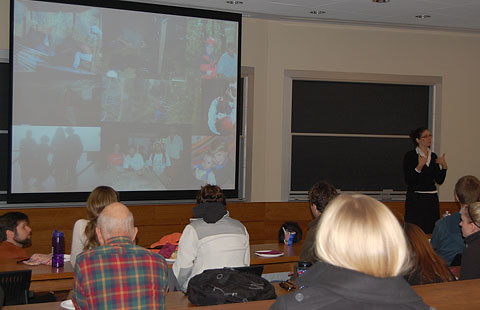 Colgate’s celebration of the 200th anniversary of Charles Darwin’s birth kicked off Tuesday with a lecture about one of the naturalist’s legacies – the study of biodiversity – and a warning that the home for a vast array of plant and animal species is threatened.
Colgate’s celebration of the 200th anniversary of Charles Darwin’s birth kicked off Tuesday with a lecture about one of the naturalist’s legacies – the study of biodiversity – and a warning that the home for a vast array of plant and animal species is threatened.
The university has several events this week to honor Darwin, including the dedication of a “thinking path” at the top of the former ski hill, a Tree of Life cake baked by students, a film, and a colloquium.
On Tuesday, students filled Meyerhoff Auditorium in the Ho Science Center to listen to Catherine Cardelús, assistant professor of biology, discuss “Darwin, Plants and Tropical Diversity.”
Cardelús noted how Darwin’s curiosity about the world led to the Origin of Species and his other works, which still resonate today and clearly inspired Cardelús as she discussed her research done in the rain forests of Costa Rica.
The research shows that, contrary to conventional wisdom, tropical species living in some of the warmest places on earth may be significantly threatened by global warming.
“There is a real chance we could lose what Darwin called this ‘chaos of delight,'” she said.
 |
| Catherine Cardelús, assistant professor of biology, answers questions after her presentation in the Ho Science Center. (Photo by Tim O’Keeffe) |
The work by Cardelús and four colleagues was recently published in Science magazine, and it is being used by the National Science Foundation to highlight its funding efforts to Congress.
Cardelús used photos to show students where she conducted this important research: usually from about 150 feet in the air in the midst of the incredibly dense canopy section of the rain forest. She would slowly and carefully get to her lofty perches by climbing a 10 mm-thick rope.
The canopy, she said, is a biodiversity hotspot, home to 25 percent of the tropical vascular flora and 70 percent of the animals in the rain forest. She recounted for the students a close encounter with an eyelash viper, which occurred at a height of about 110 feet. She was able to back away before the poisonous snake could strike.
Cardelús’s focus is on epiphytes, plants that grow above the ground surface and use other plants or objects for support. She said that on one tree branch alone in the rain forest, she could find 100 plant species.
The aerial spraying of pesticides and the phosphorus from smoke resulting from slash-and-burn farming techniques are threatening the canopy plants and wildlife.
The lowland tropics are threatened as global warming shifts temperature zones upslope and tropical species are driven to higher, cooler elevations. The results of such a shift could be devastating to animal and plant life.
Cardelús urged students to get involved in the global warming issue, whether it be through research, attending campus events such as this Friday’s Green Summit, or by simply taking personal steps to reduce carbon emissions.